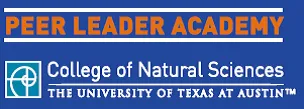The Peer Leader Academy (PLA) provides a foundation of professional development training and certification for peer leaders (tutors, mentors, undergraduate teaching assistants, etc.) who are employed in the College of Natural Sciences. Training involves the development of leadership and transferable skills that can be utilized in their current roles, in the classroom, and in their futures. Peer Leaders serve in meaningful roles and are a vital component of creating community within the college.
Benefits: What will I gain through being a part of the Peer Leader Academy?
International certification as a mentor or tutor through CRLA or certification from the College of Natural Sciences Peer Leader Academy
Transferrable Skills, Leadership Development, & interaction with UT Students, Staff and Faculty
Opportunity for valuable experiential learning
Training
Peer Leaders attain certification based on guidelines provided by the College Reading and Learning Association (CRLA) through their training and documented student contact hours.
In order to attain Level I (Basic) certification, CNS Peer Leaders complete:
15 hours of Peer Leader training within their first 2 long semesters of employment or prior to employment.
Attend a CNS PLA Training conference to earn 8 of their 15 hours of training (August or January)
50 hours of student contact
Options for earning CNS PLA training hours*
Conference Attendance (8hrs) + Supplemental Training (3 hrs) + Program Specific Training (4hrs) + 50 hrs of Student Contact = Level I Certification
CNS PLA Conference Attendance + a NSC 109 or CH372C course + 50 Hrs of Student Contact = Level I Certification
Level II and Level III Certification are earned with an additional 10 hrs of training and 25 hrs of student contact per level
*Students may not earn double credit for attending the same training more than once, excluding cultural competency & campus/community resources.
Training Topics
Training topics are based on the CRLA certification guidelines for peer tutors and mentors which include, but are not limited to:
Role of the Peer Leader
Professional Conduct
Problem-solving
Campus & Community Resources
Cultural Competency
Tutoring in Math & Science
Compliance with University & College Policies
Time management & goal-setting
Situation assessment & student referrals
Building rapport & motivating peers
Setting b
Benefits: What will I gain through being a part of the Peer Leader Academy?
International certification as a mentor or tutor through CRLA or certification from the College of Natural Sciences Peer Leader Academy
Transferrable Skills, Leadership Development, & interaction with UT Students, Staff and Faculty
Opportunity for valuable experiential learning
Training
Peer Leaders attain certification based on guidelines provided by the College Reading and Learning Association (CRLA) through their training and documented student contact hours.
In order to attain Level I (Basic) certification, CNS Peer Leaders complete:
15 hours of Peer Leader training within their first 2 long semesters of employment or prior to employment.
Attend a CNS PLA Training conference to earn 8 of their 15 hours of training (August or January)
50 hours of student contact
Options for earning CNS PLA training hours*
Conference Attendance (8hrs) + Supplemental Training (3 hrs) + Program Specific Training (4hrs) + 50 hrs of Student Contact = Level I Certification
CNS PLA Conference Attendance + a NSC 109 or CH372C course + 50 Hrs of Student Contact = Level I Certification
Level II and Level III Certification are earned with an additional 10 hrs of training and 25 hrs of student contact per level
*Students may not earn double credit for attending the same training more than once, excluding cultural competency & campus/community resources.
Training Topics
Training topics are based on the CRLA certification guidelines for peer tutors and mentors which include, but are not limited to:
Role of the Peer Leader
Professional Conduct
Problem-solving
Campus & Community Resources
Cultural Competency
Tutoring in Math & Science
Compliance with University & College Policies
Time management & goal-setting
Situation assessment & student referrals
Building rapport & motivating peers
Setting b
General members :
Members :
###
/ Board members :
/ Board :
###
Roles :
Preferred Skills :

